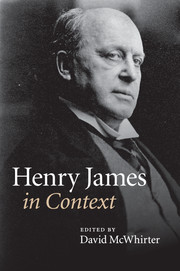Book contents
- Frontmatter
- Contents
- List of Illustrations
- Notes on Contributors
- Preface
- Abbreviations
- Chronology
- Part One Life and career, times and places
- Chapter 1 Nineteenth-century America (1843–1870)
- Chapter 2 Nineteenth-century Europe (1843–1900)
- Chapter 3 Victorian England (1870–1890)
- Chapter 4 Fin-de-siècle London (1890–1900)
- Chapter 5 The twentieth-century world (1901–1916)
- Chapter 6 Autobiographies and biographies
- Chapter 7 Letters and notebooks
- Chapter 8 The James family
- Part Two Historical and cultural contexts
- Part Three Reception
- Further reading
- Index
- References
Chapter 3 - Victorian England (1870–1890)
Published online by Cambridge University Press: 05 August 2014
- Frontmatter
- Contents
- List of Illustrations
- Notes on Contributors
- Preface
- Abbreviations
- Chronology
- Part One Life and career, times and places
- Chapter 1 Nineteenth-century America (1843–1870)
- Chapter 2 Nineteenth-century Europe (1843–1900)
- Chapter 3 Victorian England (1870–1890)
- Chapter 4 Fin-de-siècle London (1890–1900)
- Chapter 5 The twentieth-century world (1901–1916)
- Chapter 6 Autobiographies and biographies
- Chapter 7 Letters and notebooks
- Chapter 8 The James family
- Part Two Historical and cultural contexts
- Part Three Reception
- Further reading
- Index
- References
Summary
As a Canadian attending Canadian schools in the 1980s (when the mix of UK-based and US-based professors in Canada was at its zenith), my first encounter with James occurred when, as an undergraduate, I was taught ‘The Great Tradition’ proclaimed by F. R. Leavis, who included James as one of the four essential and most influential writers in the history of the English novel. However, as I was to learn when I entered graduate school and met the ‘other’ ex-pats (those from across the border, as opposed to ‘the pond’), James’s Englishness, however ambivalent an affiliation it might have been for the novelist himself, was an even more contentious issue for scholars than I had thought: born in the United States, James can be and is quite reasonably considered an ‘American’, and, indeed, representative of particularly American traditions, as Richard Chase argued more than fifty years ago. James’s nationality, I would discover, was also a matter of interest to his contemporaries on both sides of the Atlantic. It is both curious and instructive to read a note published in the New York Times on 13 March 1893, reprinted from the Westminster Gazette, to the effect that James was about to visit Paris, with the added emphasis:
Henry James, however, prefers the literary life of London, finding that the Parisians, whom he describes as being at least forty years ahead of the world, gallop through life at a speed with which he is unable to keep pace. He decidedly prefers the more plodding pace of London and the less rapid celebration of the Anglo-Saxon homme de letters [sic].
- Type
- Chapter
- Information
- Henry James in Context , pp. 26 - 36Publisher: Cambridge University PressPrint publication year: 2010

